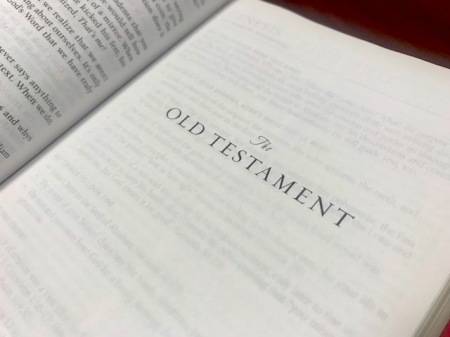11% of Protestants can't distinguish between Old, New Testaments

More than one-tenth of Protestants cited a New Testament story when asked about their favorite Old Testament passage, according to the results of a new study.
Lifeway Research released a report last week titled “Protestant Churchgoer Views on Bible Stories” based on responses collected from 1,008 American Protestant churchgoers in September 2023. The survey asked respondents “Of all the stories found in the Old Testament of the Bible, which one is your favorite?”
A plurality of those surveyed (13%) identified the book of Exodus and its focus on Moses as their favorite part of the Old Testament. The story of Noah and the Ark was the second most popular, with 11% of Protestant churchgoers listing it as their favorite part of the Old Testament.
However, the share of respondents who enjoyed the story of Noah and the Ark the most was equivalent to the percentage who listed a New Testament story or book as their favorite part of the Old Testament. An additional 7% responded with “none” when pressed on their favorite part of the Old Testament, while 3% said they did not know.
This means that only 79% of participants actually identified an Old Testament story or book when asked about their favorite part of the Old Testament.
“While churchgoers may open a Bible at church, at least 1 in 5 may not be familiar with how it is organized and what distinguishes the New Testament from the Old Testament,” said Scott McConnell, CEO of Lifeway Research, in a statement shared with The Christian Post. “Some of these attendees may have spent less time in the Bible while others may not know the Bible for themselves because someone else has always been their GPS for navigating it.”
Other books and stories widely embraced by Christians as their favorite parts of the Old Testament include the book of Genesis (10%), the story of David and Goliath (8%), the story of Adam and Eve (5%), the story of Job (4%), the story of Ruth (4%), the story of Joseph (3%), the story of Jonah (3%), the story of Daniel (3%), the story of Esther (2%), the story of David (2%), the book of Psalms (2%), the story of Cain and Abel (2%), the story of Abraham (1%), the story of Elijah (1%) and the story of Samson (1%).
Less than 1% of respondents selected all remaining options as their favorite book or story in the Old Testament. The survey also examined churchgoers’ ability to recite or summarize some of the most notable Bible stories from memory.
When it comes to the story of David and Goliath, 34% said they “could tell it all accurately,” while 39% insisted they “could tell it, but some details might be missing or wrong.” Twenty-three percent expressed confidence that they “could only give a quick overview” of the story, and 3% believed they “couldn’t tell any of it.” Less than 1% asserted that it was not a Bible story.
Slightly higher shares of respondents thought they could tell all (39%) or most (43%) of the story of Noah’s Ark as the percentage of those surveyed who felt confident enough to “only give a quick overview” dropped to 17%. Just 1% said they “couldn’t tell any of it,” while less than 1% didn't recognize it as a Bible story.
There was much less confidence regarding the ability to recite all (24%) of the story of Daniel and the Lion’s Den from memory although the same percentage (39%) that thought they could summarize the story of David and Goliath accurately said the same about Daniel and the Lion’s Den. One percent contended that it was not a Bible story.
Twenty-nine percent of respondents expressed confidence in their ability to tell all of the story of God asking Abraham to sacrifice Isaac, while 35% thought they could describe most of it. Twenty-six percent characterized their knowledge of the story as enough to give merely an overview, while less than 1% did not believe it was a Bible story.
As for the story of Jonah and the big fish, a plurality (35%) told pollsters that they could tell most of it from memory, while 28% maintained they could tell all of it. Twenty-six percent viewed their knowledge of the story as enough to give a “quick overview” and 8% did not think they could tell any of it. Two percent of those surveyed could not identify it as a Bible story.
While most of the survey dealt with respondents’ views about actual Bible stories, it included a question asking for their thoughts about a nonexistent Bible story: The story of Romulus and Remus. Only a plurality of those surveyed (39%) recognized that the fictional passage was not part of the Bible.
By contrast, a majority of respondents seemed to think the Bible does contain the aforementioned book. Thirty-three percent of those surveyed said they “couldn’t tell any of it” as 16% highlighted their ability to “give a quick overview” about the nonexistent passage, and 6% possessed an even higher degree of confidence that they could recall most of it. Just 1% proclaimed that they could recite Romulus and Remus from memory.
“The large number of churchgoers that readily admit they are fuzzy on some of the details of God’s interactions with the patriarchs helps explain the need for regular Bible teaching in churches,” remarked McConnell. “While recognizing the names of every person mentioned in the Bible may have little value, the Christian faith does place great value on recognizing biblical teaching from other voices because Jesus said He is the only way.”
Ryan Foley is a reporter for The Christian Post. He can be reached at: ryan.foley@christianpost.com





















